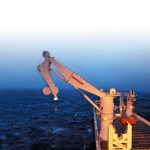Increasing levels of vessel system automation means new opportunities. Alexander Nürnberg, Senior Vice President R&D and Technology, MacGregor, is very optimistic. Only the low market is hindering a quicker uptake of innovations
What is the impact of digitalization on manufacturers of deck equipment and machinery, what is their role?
Alexander Nürnberg: If[ds_preview] we consider the production process of ships in the global environment, digitalization will enable us to communicate with shipyards and suppliers much faster, in much more detail and in a more direct dialogue. Using this in a smart way will increase efficiency and help reducing additional costs and loss of time due to lack of information or misunderstandings. Digitalization under the aspect of increased connectivity of sailing vessels during ship operation opens completely new models of supporting the ship operation in real time. Furthermore the machinery manufacturers get real life data and can use them to optimize their design and offering.
What will the future look like, which opportunities does digitalization hold for you and the industry?
Nürnberg: Connectivity will lead to much more land-based monitoring of vessels on sea. The road will lead from measuring/monitoring via remote control to a higher degree of automation and finally to increasing autonomy in operation. The autonomous ship is a vision now but we will come closer year by year following the ability to identify the environment via sensors.
What does MacGregor already offer what do you have under development to shape this future?
Nürnberg: The offshore sector has been a strong innovation driver in the past. Reasons were high demand for oil, safe and short return of investments and extremely expensive operations in harsh environmental conditions. Our offshore construction cranes offer full connectivity via GSM or satellite and our »on-watch« feature supports operations globally with a 24/7 availability. More than 300 cranes have been delivered including this optional feature. We will expand this to the complete product portfolio knowing that not all equipment is as mission critical as the offshore cranes. Good product features create the demand by themselves.
Digitalization will mean a lot of data from different sources, formats and systems – is your solution to cooperate with others or to offer as much as possible from a single source?
Nürnberg: Very good question! We feel this is too early to answer. Our current developments are considering both directions. With the right partner we will offer a system which is open to all stakeholders in shipbuilding and operation. But at the same time we should be able to offer normalized data of our products for integration into other systems. The market will be flooded with systems and applications in the near future. Typically a consolidation period follows and the winners will offer the integration of various data into their systems.
How does the current state of the market influence the development of digitalization and connected systems?
Nürnberg: Merchant and offshore markets are in a very low cycle and our customers, shipyards and ship/offshore operators, are not in an investing mood. Activities are driven by our industry and the need is acknowledged, but there are visible constraints due to lack of free cash and uncertain return of investment periods. Interview: Felix Selzer





















